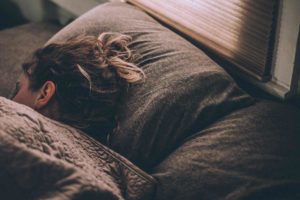If you are having trouble sleeping after being the victim of a concussion it can be a serious problem, because if you do not start the day feeling refreshed the results can be debilitating.
Concussion Sleep Issues after Car Accidents
If you have suffered a concussion, it can affect how well you may be sleeping. Some of the most common sleep issues after a concussion are listed below and may be affecting your sleep patterns:
- Insomnia: You may be finding it difficult to get to sleep or stay asleep.
- Medications: Some medications can affect your sleeping patterns.
- Stress: Stress and worry can contribute to how well you sleep and/or how restful your sleep is
- Pain: You may be experiencing pain from your concussion or other medical conditions or injuries that make it difficult for you to get restful sleep
- Other medical problems: There are a multitude of other medical issues that could be affecting how you sleep
Sleep is especially important after suffering a concussion because it helps the brain with the healing process, and helps you feel better when you wake in the morning.
Develop a Sleep Routine following a Concussion
Having a good bedtime routine that is consistent can aid in how well you fall asleep and stay asleep, especially after a concussion. Here are a few pointers to help you develop your own bedtime routine:
- Stay on a bedtime schedule, even on the weekends. Try to go to bed and wake up at the same time every day. Use an alarm clock if necessary to help you stickto a schedule.
- Give yourself 30 minutes to fall asleep. If you can’t fall asleep within 30 minutes get out of bed and do something you find relaxing, like reading a book or meditate, then return to bed when you feel tired.
- Avoid naps. Resting is extremely important for a few days after you’ve suffered a concussion. However, after the first few days try to avoid taking a nap during the day. If you take naps, it could make it more difficult for you to fall asleep and stay asleep at night.
- If you feel you have to take a nap, then take a short power nap, no more than 20 or 30 minutes. Also, try to have your nap before 3:00 in the afternoon.
- Do something you find relaxing before going to bed.
Lifestyle Changes to Improve Your Sleep Following a Concussion
If you make small lifestyle changes after a concussion, it could help with you getting enough sleep. Try adjusting the following to help with your sleep:
- Avoid alcohol, caffeine, or heavy meals 4 to 6 hours before you go to bed.
- Make sure you’re getting enough magnesium, iron, and B vitamins.
- Get as much natural light during the day as you can. Spend time outside.
- Try to get 30-60 minutes of exercise a day, but not right before bedtime. Be sure to check with your doctor before starting any exercise regimen.
- Keep your bedroom dark, quiet, and cool.
- A white noise machine or a fan produce natural sounds that can help block out any noises that may be preventing you from falling asleep.
- Try to keep your cell phone and laptop out of your bedroom. The light from those devices makes your brain work harder and could be preventing you from getting to sleep or staying asleep.
LOSS OF CONSCIOUSNESS
It would not be unusual for you to have lost consciousness at the time your concussion occurred. It also would not be unusual if you lost consciousness shortly after the time of your concussion.
Why People Who Suffer a Concussion May Lose Consciousness
There can be a lot of reasons someone suffering from a concussion or other traumatic brain injury can lose consciousness.
- If your concussion was caused by blunt force trauma, this can lead to not only a concussion but a cut or fractured skull. These injuries, could make you lose consciousness.
- Change of blood flow to your brain. Too much or too little blood flow in the brain could lead to you being unconscious.
- A concussion or other traumatic brain injury could increase the pressure inside your cranium. This change in pressure could cause you to lose consciousness.
Why it Matters When You Lose Consciousness
If your concussion was due to blunt force trauma and you lost consciousness immediately, then by definition you would be diagnosed as having a concussion by a doctor.
However, if you lost consciousness several minutes after the injury to your brain, it could indicate that there is bleeding occurring in your brain, which may lead to a different diagnosis and treatment plan to be prescribed by your doctor. An active brain bleed is an extremely serious situation, and it is imperative that you seek medical attention immediately if you lose consciousness after the injury to your brain.
If you lose consciousness after a concussion or other type of traumatic brain injury, when you wake up is dependent on certain conditions. You may wake up almost immediately, or you may require surgery to relieve the swelling of your brain before you regain consciousness. Once you are awake, other symptoms could begin to show up manifest For example, you could have problems with your motor and sensory functions.
Concussions and other types of traumatic brain injuries are serious injuries that should not be ignored. he South Carolina law office of David R. Price, Jr., P.A. strongly urges anyone with a concussion to seek medical treatment immediately.
In addition, if your injury was caused by an accident or the negligence of someone else, you should consult a qualified personal injury attorney to make sure you get all the compensation you and your family deserve. Contact the attorneys at David R. Price, Jr., P.A., today for a free consultation.

